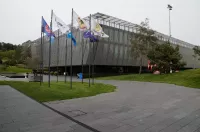Camp Nou is a stadium in Barcelona and the home of FC Barcelona since 1957. It is currently being renovated to become the largest stadium in Europe, with a planned seating capacity of 105,000. It will be the third largest association football stadium in the world upon completion.
1937: Inspiration from De Kuip
Camp Nou was inspired by De Kuip, home of Feyenoord Rotterdam, which was built in 1937.
June 1950: Signing of László Kubala
In June 1950, the signing of László Kubala, one of Barcelona's greatest players, added impetus to the construction of a larger stadium.
November 1950: Agreement to Acquire Land
On November 14, 1950, Agustí Montal i Galobart obtained the assembly's agreement to acquire land for a new stadium in Hospitalet de Llobregat.
1950: Land Acquisition
Francesc Miró-Sans decided in favor of the land acquired in 1950 for the stadium construction.
February 1951: Recommendation of Alternate Location
In February 1951, the commission dedicated to the project recommended another location for the stadium.
November 1953: Appointment of Francesc Miró-Sans
On November 14, 1953, Francesc Miró-Sans was appointed as president of Barcelona, which relaunched the stadium project.
March 1954: Start of Construction
Construction of Camp Nou began on March 28, 1954, because Barcelona's previous stadium had no room for expansion.
March 1954: Laying of the First Stone
On March 28, 1954, the first stone of the stadium was laid, after Miró-Sans decided in favor of the land acquired in 1950.
September 1957: Inauguration of Camp Nou
On September 24, 1957, Camp Nou was inaugurated with a solemn mass and the attendance of dignitaries and approximately 90,000 people.
1957: Camp Nou Opening
In 1957, Camp Nou officially opened, becoming the home stadium for FC Barcelona.
1964: European Nations' Cup Matches
In 1964, Camp Nou hosted half of the four matches at the European Nations' Cup.
May 1972: European Cup Winners' Cup Final
In May 1972, Camp Nou hosted its first European Cup Winners' Cup final, where Rangers won against Dynamo Moscow with a score of 3–2.
1975: Installation of Electronic Scoreboards
Electronic scoreboards were installed at Camp Nou in 1975.
1980: Expansion in Anticipation of the World Cup
In 1980, an expansion was undertaken in anticipation of the 1982 FIFA World Cup, adding boxes, VIP lounges, a new press area, new markers and the construction of the third tier.
1982: Expansion in Anticipation of the World Cup
In 1980, an expansion was undertaken in anticipation of the 1982 FIFA World Cup, adding boxes, VIP lounges, a new press area, new markers and the construction of the third tier.
1982: FIFA World Cup Matches
In 1982, Camp Nou hosted five matches of the FIFA World Cup, including the opening game.
1982: Increase of capacity for the FIFA World Cup
The capacity of the stadium grew to 121,401 for the 1982 FIFA World Cup.
March 1986: Record Attendance
On March 5, 1986, Barcelona's record attendance was set during the European Cup quarter-final against Juventus, with 120,000 spectators.
May 1989: European Cup Final
On May 24, 1989, Camp Nou hosted the European Cup final between Milan and Steaua București, with Milan winning 4–0.
1989: European Cup Final
In 1989, Camp Nou hosted a European Cup final.
1992: Summer Olympics Football Competition
In 1992, Camp Nou hosted part of the football competition, including the final, at the Summer Olympics, leading to the installation of two additional tiers of seating.
1993: Stadium Renovation
In 1993, the Camp Nou underwent renovation, which included lowering the pitch and removing standing room.
1998: Completion of Renovations
During 1998–99, renovations were completed including new press box, presidential grandstand, parking and new lighting and sound systems. UEFA rated Camp Nou a five-star stadium.
1999: Champions League Final
In 1999, Camp Nou hosted a Champions League final.
2000: Official Renaming to Camp Nou
In the 2000–01 season, club members voted to officially rename the stadium to Camp Nou, its popular nickname.
September 2007: Selection of Norman Foster for Restructuring
On September 18, 2007, Norman Foster and his company were selected to "restructure" the Camp Nou, adding approximately 6,000 seats.
2008: Postponement Due to Financial Crisis
Due to the 2008 financial crisis, the sale of the training ground and the remodeling project were postponed.
2009: Original Start of Renovation Plan
The Camp Nou restructuring project was originally planned to begin in 2009 and be finished for the 2011–12 season.
May 2010: Dismissal of Mini Estadi Sale
In May 2010, Sandro Rosell dismissed the possibility of selling the Mini Estadi to finance the remodeling.
June 2010: Halt of Remodeling Plan
On June 30, 2010, Sandro Rosell's election effectively halted the plan to remodel the Camp Nou.
2011: Original Planned Finish of Renovation
The Camp Nou restructuring project was originally planned to begin in 2009 and be finished for the 2011–12 season.
January 2014: Rejection of Building New Stadium
In January 2014, Barcelona's board rejected the option of building a new stadium and instead opted to remodel the Camp Nou.
November 2014: Announcement of Top 14 Final Venue
On November 4, 2014, it was announced that the 2015–16 Top 14 final would be held at Camp Nou on June 24, 2016.
May 2015: Release of Refined Plan
In May 2015, a refined plan was released showing plans to add a canopy over the stands and detailing seating expansion.
2015: Reason for Venue Change
The 2015-16 French season was shifted because of the 2015 Rugby World Cup.
June 2016: Top 14 Final
On June 24, 2016, Camp Nou hosted the Top 14 final, drawing a crowd of 99,124 and setting a new attendance record for a domestic rugby union match.
October 2017: Match Played in Empty Stadium
On October 1, 2017, Barcelona's league match against Las Palmas was played in an empty Camp Nou due to political turmoil.
2017: Expected Start of Remodeling
The Camp Nou remodeling project was expected to run from 2017 to early 2021.
May 2019: Super League Game Hosted
On May 18, 2019, Camp Nou hosted the first Super League game in Spain, where the Catalans Dragons defeated the Wigan Warriors 33–16, setting a Super League attendance record.
2019: Planned Start of Construction
Construction for the Camp Nou remodeling project was planned to begin in summer 2020 and to be completed in 2024.
2020: Planned Start of Construction
Construction for the Camp Nou remodeling project was planned to begin in summer 2020 and to be completed in 2024.
2021: Expected Finish of Remodeling
The Camp Nou remodeling project was expected to run from 2017 to early 2021.
April 2022: Confirmation of Renovation Start
On April 28, 2022, the club confirmed that renovations would begin after the 2022–23 season.
2022: Large Attendances for Women's Football
In 2022, Barcelona had the largest known attendances for women's football since 1971 at Camp Nou in the Women's Champions League. Real Madrid and Wolfsburg were the visiting teams.
2022: Start of Stadium Renovation
The renovation of Camp Nou stadium commenced after the end of the 2022-2023 season.
March 2023: Kings League Final Four
In March 2023, Camp Nou hosted the inaugural Kings League Final Four, generating controversy for forcing the women's Clásico to be played at the Johan Cruyff Stadium.
June 2023: Start of Renovation Work
Renovation work on the Camp Nou stadium began on June 1, 2023.
2023: Use of Estadi Olímpic Lluís Companys
During the 2023-2024 season, Estadi Olímpic Lluís Companys served as Barcelona's home ground during the Camp Nou renovation.
December 2024: Expected Return to Camp Nou
Barcelona president Joan Laporta stated that the club expected to return to Camp Nou by December 2024, when most of the work will be done.
2024: Planned Completion of Construction
Construction for the Camp Nou remodeling project was planned to begin in summer 2020 and to be completed in 2024.
2024: Use of Estadi Olímpic Lluís Companys
During the 2024-2025 season, Estadi Olímpic Lluís Companys will serve as Barcelona's home ground during the Camp Nou renovation.
2025: Use of Estadi Olímpic Lluís Companys
During the 2024-2025 season, Estadi Olímpic Lluís Companys will serve as Barcelona's home ground during the Camp Nou renovation.
June 2026: Scheduled Completion of Renovations
Final completion of all renovations is scheduled for June 2026.
Mentioned in this timeline
FC Barcelona or Bar a is a professional football club...

Football encompasses a variety of team sports centered on kicking...

Barcelona is a major city located on the northeastern coast...

FIFA F d ration Internationale de Football Association is the...

The Men's Rugby World Cup is a quadrennial rugby union...
Spain officially the Kingdom of Spain is a large country...
Trending
Pauline Collins is a celebrated British actress She gained initial recognition for her role as Sarah Moffat in the popular...
Yannick Hanfmann is a German professional tennis player He reached his highest ATP singles ranking of world No in July...

14 days ago Berrettini defeats Popyrin in Vienna Open opener; faces Norrie next in ATP.
The UEFA Europa League UEL is an annual football club competition organized by UEFA since Serving as the second-tier competition...
36 minutes ago Avengers: Doomsday Trailer Release Date Revealed; Fantastic Four Spoiler Leaked, New Rumors Surface

2 hours ago Isla Fisher Reveals Woody Harrelson's Unusual Habit on Air, Leaving Al Roker in Hysterics
Popular

Nancy Pelosi is a prominent American politician notably serving as...

Zohran Kwame Mamdani is an American politician currently serving as...

William Franklin Graham III commonly known as Franklin Graham is...

Chuck Schumer is the senior United States Senator from New...

Gavin Newsom is an American politician and businessman currently serving...
Abigail Spanberger is an American politician who served as the...